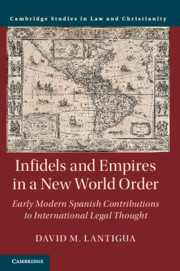 Infidels and Empires in a New World Order
Infidels and Empires in a New World Order from Part II - God, Empires, and International Society
Published online by Cambridge University Press: 11 June 2020
In view of seventeenth-century Protestant humanist transformations, this concluding chapter returns to the Spanish Dominicans and their scholastic-juristic view on the law of nations as a normative resource for thinking about international society. Their Thomistic attention to the rationality of the universal law of nations as positive human law enabled political recognition of non-European polities, the lawful occupants of the Indies. This contrasted with an imperial-humanist jurisprudence that provincialized natural law and the law of nations under European civilizational hierarchy to justify dispossession of inferior peoples. The chapter especially charts the evolution of Las Casas’s thinking through his interaction with the theologians at Salamanca. His eclectic synthesis of Thomistic theology, canon law, Roman law, and humanism to buttress indigenous occupation exemplified a radical scholastic brand of legal humanism that complicates static ideological categories in the history of international legal thought. By placing Las Casas in conversation with his Dominican confreres, a normative view of the law of nations grounded in Christian theological convictions emerges. It accounts for the independence and interdependence of all peoples, and the indispensable role of justice and solidarity in promoting world order under a Christian ethic of loving one’s neighbors.
To save this book to your Kindle, first ensure [email protected] is added to your Approved Personal Document E-mail List under your Personal Document Settings on the Manage Your Content and Devices page of your Amazon account. Then enter the ‘name’ part of your Kindle email address below. Find out more about saving to your Kindle.
Note you can select to save to either the @free.kindle.com or @kindle.com variations. ‘@free.kindle.com’ emails are free but can only be saved to your device when it is connected to wi-fi. ‘@kindle.com’ emails can be delivered even when you are not connected to wi-fi, but note that service fees apply.
Find out more about the Kindle Personal Document Service.
To save content items to your account, please confirm that you agree to abide by our usage policies. If this is the first time you use this feature, you will be asked to authorise Cambridge Core to connect with your account. Find out more about saving content to Dropbox.
To save content items to your account, please confirm that you agree to abide by our usage policies. If this is the first time you use this feature, you will be asked to authorise Cambridge Core to connect with your account. Find out more about saving content to Google Drive.